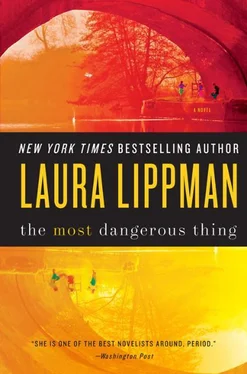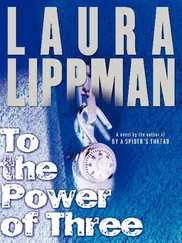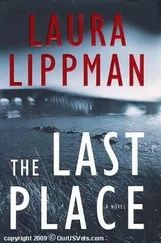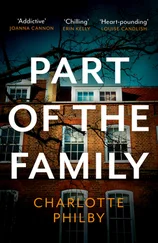“I hate it here,” Fee said. “It’s boring.”
“There’s no place to go,” Miller said. “There’s nothing to do.”
“Only boring people are bored,” their father said.
“Or maybe only boring people don’t realize how bored they are,” Fee said. “They are so boring that it never occurs to them to do anything.”
“Gwen likes it here,” their father said.
“Well, Gwen .” Fee sniffed. “She’s a child.”
“Of course I’m a child,” Gwen said mildly. “I’m ten.”
“The thing is,” Miller pressed on, intent on making his case, “there are plenty of kids for Gwen to play with-that Mickey girl, those brothers-”
“We do NOT play with the Halloran boys. They’re too wild,” Gwen put in.
Gwen spoke the truth, at the time. In the summer of our nation’s bicentennial, the five of us were not friends yet and the Hallorans were considered wild. We were two and three-the two girls, Gwen and Mickey, the three brothers, Tim, Sean, and Go-Go. We would not come together as a group until the following spring. But we were all aware of each other. Mickey was a familiar little figure in Dickeyville, a terrifying tomboy assumed to be a loner by choice, a child who wanted to be outdoors no matter how fierce the weather. The Halloran boys were known as hellions, primarily because of Go-Go. Besides, in the summer, they went down to the ocean, then to camp.
And Gwen’s family, the Robisons, were famous in Dickeyville because they had been trying to build their new house for almost seven years, stopped twice by injunction because of the neighborhood’s historic status. Strangely, Dr. Robison did not resent the neighborhood’s resistance to his house. This was his dream house and he would suffer anything to get it. He had bought the lot a decade earlier, around the time Gwen was born, after stumbling across Dickeyville while trying to get to the Forest Park golf course. First he had been told that the lot wasn’t suitable for building, that its pitch would make it impossible. He refused to accept this and finally found an architect who said it could be done, although at great expense. Then the neighborhood had decided to fight it, although Dickeyville had its share of postwar nondescript houses. The Hallorans lived in one, in fact, but did not feel themselves hypocrites for joining the opposition. The Robison house-new, modern-signified something, even if no one was quite sure what. Change, hypocrisy, a challenge to traditional values. Yet nine years after the lot was purchased, five years after ground was broken, the house had asserted itself into being, through the sheer force of Dr. Robison’s will.
This apparently came as something of a surprise to Mrs. Robison and the two older children, twenty-year-old Miller and seventeen-year-old Fee. And although Miller had to endure only summers there, and although Fee had only a year of high school left and she was continuing at Park, the same private school Gwennie attended, they were bitter. Mrs. Robison was not bitter, not exactly, but we all sensed something in her attitude. How to put it? There was a quality of withholding. In her beautiful, hippieish clothes, she moved through the world with her head down and arms crossed, as if to say to Dickeyville: I will not love you, I will not. Inevitably, all the fathers and even some of their sons were a little bit in love with Tally Robison, mistaking her coolness to her surroundings as a coolness toward them, which never fails to provoke a man. Gwen never doubted her mother’s love, however, which was mildly infuriating to the rest of us, who sometimes wondered if our mothers were altogether pleased by our existence. Mickey’s mom, the boys’ mom-they tended toward moments of frustration. Doris Halloran, in particular, had a way of asking “Why were you born?” as if she didn’t really know, or as if she was debating the church’s doctrine on abortion. Not that abortion was legal even when the youngest of the Halloran boys, Go-Go, was conceived. But we still had the impression that Mrs. Halloran would have appreciated having a choice.
But we didn’t care what the grown-ups thought, or even Gwennie’s older brother and sister, impressive as they were, with their driver’s licenses and studied indifference to us. In our imaginations, we lived in a world without grown-ups most of the day. We all had the same rules, more or less. Don’t ride your bikes on Forest Park Avenue (busy, blind curves), be on time for dinner, and stay out of the creek. We found a way around the first rule, had no problem with the second, and figured the third didn’t matter if our tetanus shots were current. We never went into the creek on purpose, but we ended up in it a lot by accident.
Gwen and Mickey met by the creek that bicentennial summer. Mickey was lying belly-down on the bank, near a culvert where crawfish were sometimes found, poking the murky water with a long stick.
“I’m Gwen,” Gwen said shyly to the wiry little back and frowsy black hair.
“You live in that big house, at the end of the road. Are your parents rich?” Mickey replied, eyes fixed on the brown water.
“I don’t think so.” Gwen considered the evidence. Their house was grand, at least on the lower floors. The bedrooms felt a little stingy. Fee and Miller had a car, but they had to share it, and it was an old Volvo. Her parents went to New York once a year to go to the theater and shop for Christmas gifts. Did this make them rich?
“What does your father do?”
“He’s a doctor.”
“So you’re rich,” Mickey said, eyes never leaving the water. Did crawfish really live there? Gwen could not imagine it. But Mickey insisted they were there and that, furthermore, she was going to take them home and eat them. If she caught any. She had a net at the ready, but it didn’t look up to the job. It was tiny, the kind of thing used in tropical aquariums. Even one small crawfish would test its capacity.
“He’s the kind of doctor who teaches.”
“My dad owns the service station, up the hill. Well, he’s not really my dad, but my stepdad. He’s good-looking. He looks like Tom Selleck.”
“That’s cool. Him owning the service station.”
“No, it’s not. Because when I want a soda or a snowball or something from the pharmacy next door, I can’t go there because someone from the station will rat me out. And there’s nowhere else to go. There used to be a store here in the neighborhood, where they sold penny candy, but they stopped. Do you have treats at your house?”
“What?”
“Treats. Ice cream and cookies and candy and soda? I suppose not, your father being a doctor.”
“Oh, no, we have-treats. My mother goes grocery shopping once a week, and each one can choose whatever snacks we want. But that’s it, for the week. If you eat it all up right away, you have to wait until the next week.” Gwen did not add that she had learned all sorts of ways of making treats last. She nibbled 5 th Avenue candy bars, plucking off the solitary almond, then slowly removing the chocolate with teeth and tongue, leaving behind an unsheathed bar of peanut butter. She ate peanut M &M’s by cracking the chocolate shell, removing the peanuts, then placing the peanuts in a bowl, to be gobbled in a handful. She was proud of these maneuvers but aware that others considered them gross. Besides, she was pudgy and desperate to pretend candy was not particularly interesting to her, that her condition was glandular.
Mickey sat up. “Would you get circus peanuts sometimes?”
“Peanuts?”
“Circus peanuts. The big fluffy ones. Kind of like Peeps, only not so sticky.”
“Sure.”
The next Friday, on her mother’s weekly shopping trip, Gwen put a bag of the orange peanuts into the cart. “Really?” her mother asked. “You hate marshmallow.” Gwen nodded. The next day, she took the treats to Mickey. Over the course of the summer, she brought Mickey Smarties, candy buttons, Pixy Stixs. Necco Wafers. Now and Laters. Gwen’s mother figured it out within a week or so, but she didn’t care. In fact, she complimented Gwen on her selflessness. But it didn’t feel selfless to Gwen, more like a necessary tribute. Mickey was valuable. Mickey knew things. You couldn’t have access to all she knew without making some sort of contribution.
Читать дальше
Конец ознакомительного отрывка
Купить книгу












